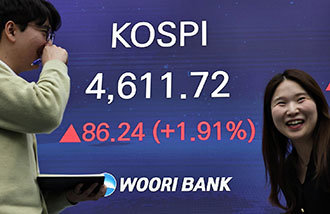[Editorial] Why the Sudden Objection?
[Editorial] Why the Sudden Objection?
Posted July. 21, 2009 07:50,
Floor leader Lee Kang-rae of the main opposition Democratic Party said, Facing opposition from former Grand National Party leader Park Geun-hye on the passage of media reform bills, Grand National Party leaders are in a state of confusion. After ruling party lawmaker Lee Jung-hyun delivered Parks opinion that she will oppose the bills if she attends a general meeting of the National Assembly yesterday, the opposition party turned lighthearted as if it was rescued. Park has never clearly expressed her opinion on the bills even at general meetings of the Assembly members. Her sudden objection at a time when passage of the bills is impending has made even her confidants confused. When the ruling and opposition parties fought Jan. 5 over newly suggested bills, Park said, The Grand National Party suggested some bills, arguing that they are designed for the Korean people. But they have given disappointment and pain to the people. She gave no detailed explanation for this comment.
Park has unexpectedly expressed her opinion again, while intensifying uncertainty over the passage of media reform bills at a time when the National Assembly is about to pass them. The ultimate goal of the bills is to reduce barriers between newspapers and broadcasting, providing diverse and quality information and creating more jobs. Thus, critics have questioned Parks opinion.
After negotiations with the then ruling Uri Party in 2005, Park agreed to put the newspaper bill to a vote under the Roh Moo-hyun administration. The bill was passed by the National Assembly but the Constitutional Court ruled the bill partly unconstitutional 18 months later. At a seminar held by the Korea News Editors Association in June 2007, Park promised measures to free the media from economic and political pressure and strengthen the competitiveness of the media industry. This was when she hoped to be the Grand National Partys presidential candidate. It is lamentable that Park appears negative toward opening the media market, a sector that has long been dominated by terrestrial TV stations.
Park also began confusion July 15 when she said, If a company has a market share of around 30 percent, diversity will be guaranteed and fears over an oligopoly will disappear. It is understandable that she wants to prevent certain broadcast stations and newspapers from dominating public opinion. Yet measuring the medias influence is tough since broadcast stations and newspapers affect public opinion in different ways.
Park is considered the ruling partys presidential candidate in 2012, but has rocked the ruling camp with her short message. Moreover, party lawmakers are being careful not to provoke her. Given that, it is worrisome whether the ruling party and Park can play their due role in dealing with state affairs.



![쓸개 파열로 “사흘 남았다” 판정받은 시인…18년뒤 “너를 아껴라” 속삭여[손효림의 베스트셀러 레시피]](https://dimg.donga.com/c/138/175/90/1/wps/NEWS/IMAGE/2026/01/08/133113134.1.jpg)

![“‘휴지심’ 아직도 버려?” 0원으로 집안 환경 바꾸는 법 [알쓸톡]](https://dimg.donga.com/c/138/175/90/1/wps/NEWS/IMAGE/2026/01/07/133110227.3.png)

